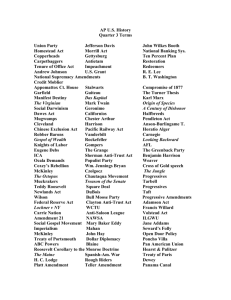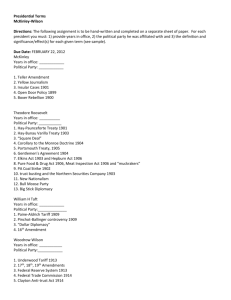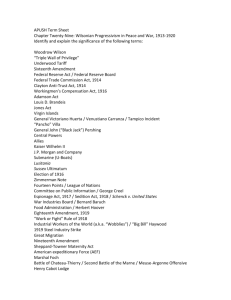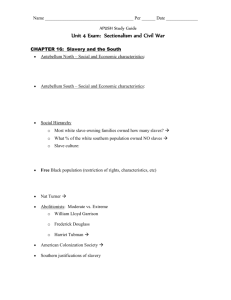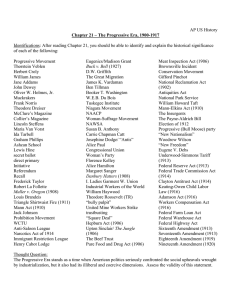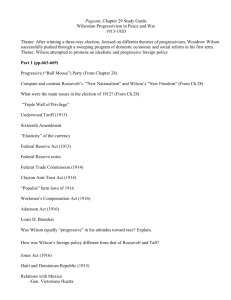1890-1921 US History Timeline: Imperialism & Progressive Era
advertisement
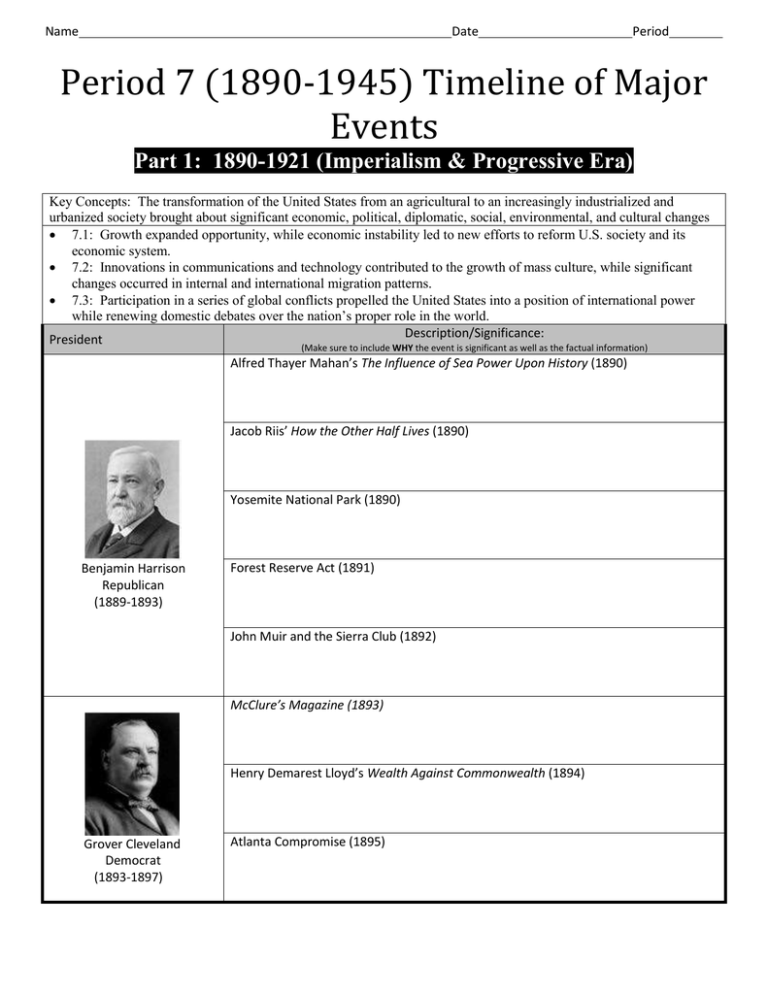
Name Date Period Period 7 (1890-1945) Timeline of Major Events Part 1: 1890-1921 (Imperialism & Progressive Era) Key Concepts: The transformation of the United States from an agricultural to an increasingly industrialized and urbanized society brought about significant economic, political, diplomatic, social, environmental, and cultural changes 7.1: Growth expanded opportunity, while economic instability led to new efforts to reform U.S. society and its economic system. 7.2: Innovations in communications and technology contributed to the growth of mass culture, while significant changes occurred in internal and international migration patterns. 7.3: Participation in a series of global conflicts propelled the United States into a position of international power while renewing domestic debates over the nation’s proper role in the world. Description/Significance: President (Make sure to include WHY the event is significant as well as the factual information) Alfred Thayer Mahan’s The Influence of Sea Power Upon History (1890) Jacob Riis’ How the Other Half Lives (1890) Yosemite National Park (1890) Benjamin Harrison Republican (1889-1893) Forest Reserve Act (1891) John Muir and the Sierra Club (1892) McClure’s Magazine (1893) Henry Demarest Lloyd’s Wealth Against Commonwealth (1894) Grover Cleveland Democrat (1893-1897) Atlanta Compromise (1895) Anti-Saloon League (1895) Election of 1896 Republicans Democrats Klondike Gold Rush (1896-1899) Seward’s Folly (1867) Annexation of Hawaii (1898) William McKinley Republican (1897-1901) Foreign intrusion Queen Liliuokalani Republic of Hawaii (1894-1898) Why Hawaii? Spanish-American War (April 1898-February 1899) SEE ATTACHED WAR CHART Philippine-American War (1899-1902) Open Door Policy (1899) Boxer Rebellion (1900) Hay’s Second Round of Notes (1900) National American Woman Suffrage Association (NAWSA) founded (1900) Election of 1900 Republicans Democrats Platt Amendment (1901) Booker T. Washington’s Up From Slavery (1901) McKinley Assassinated (September 14, 1901) Extra Notes/Info on William McKinley: Progressive Political Reforms Direct Democracy Secret Ballot Theodore Roosevelt Republican (1901-1909) Direct Primaries Initiative Referendum Recall Local/Municipalities Public services Governments States Robert La Follette and the Wisconsin Idea (1901) Reforms Big Stick Diplomacy (1901-1909) Square Deal (1902) Newlands Reclamation Act (1902) Anthracite Coal Strike (1902) Anarchist Exclusion Act (1903) Elkins Act (1903) Ida Tarbell’s The History of the Standard Oil Company (1904) Panama Canal (1904) Roosevelt Corollary (1904) Trust-Busting (1904-1909) Lincoln Steffens’ The Shame of the Cities (1904) Election of 1904 Republicans Democrats Socialists Lochner v. New York (1905) W.E.B. DuBois’ Niagara Movement (1905) Industrial Workers of the World (1905) Hepburn Act (1906) The Jungle (1906) • Pure Food and Drug Act (1906) • Meat Inspection Act (1906) Panic of 1907 Great White Fleet (1907-1909) Dillingham Commission (1907-1911) Root-Takahira Agreement (1908) Muller v. Oregon (1908) “Gentlemen’s Agreement” with Japan (1907) NAACP founded (1909) Extra Notes/Info on Theodore Roosevelt: Election of 1908 Republicans Democrats Dollar Diplomacy (1909-1913) Railroads in China (1911) Nicaragua (1911) Payne-Aldrich Tariff (1909) Mann-Elkins Act of 1910 William Howard Taft Republican (1909-1913) National Collegiate Athletic Association (NCAA) founded (1910) Great Migration (1910-1930) Triangle Shirtwaist Fire (1911) Standard Oil Company of New Jersey v. United States (1911) Lawrence Textile Strike (1912) Lodge Corollary (1912) Extra Notes/Info on William Howard Taft: Election of 1912 Democrats Progressives Republicans Socialists Moral Diplomacy (1913-1917) 16th Amendment (1913) 17th Amendment (1913) Woodrow Wilson Democrat (1913-1921) Underwood Tariff (1913) Federal Reserve Act (1913) Clayton Antitrust Act (1914) Repeal of Panama Canal Tax Exemptions (1914) Federal Trade Commission (1914) Ludlow Massacre (1914) World War I (1914-1918) SEE ATTACHED WAR CHART Jones Act of 1916 Federal Farm Loan Act (1916) National Parks Service (1916) National Woman’s Party founded (1916) Child Labor Act (1916) Election of 1916 Democrats Republicans Jeanette Ranking elected to the U.S. House of Representatives (1916) Immigration Act of 1917 Citizenship for Puerto Ricans (1917) 18th Amendment (1919) Volstead Act (1919) Palmer Raids (1919-1920) 19th Amendment (1920) Washington Conference (1921) • Five-Power Treaty • Four-Power Treaty • Nine-Power Treaty Extra Notes/Info on Woodrow Wilson: Terms to Know • Muckrakers • Imperialism • Jingoism • Pragmatism • “Yellow journalism” • Scientific management • “A splendid little war” • Prohibition • Rough Riders • Conservation • Spheres of influence • Preservation • Anti-imperialism • Deforestation • Progressivism • Propaganda • • Self-determination Xenophobia The Spanish-American War: 1898-1899 United States Advantages/Disadvantages Major Leaders (Civilian and Military) United States Spain Spain Causes Jingoism Turning Point Battles(s) Manila Bay Cuban Revolt Yellow Journalism San Juan Hill De Lôme Letter Sinking of the Maine Filipino Insurrection McKinley’s War Message Teller Amendment Strategy Costs United States United States Spain Spain Treaty Non-Treaty Results Insular Cases (1901-1903) Treaty of Paris 1899 Platt Amendment Recognition of U.S. Power The Great War – World War I: 1914-1919 Advantages/Disadvantages Major Leaders (Civilian and Military) Allies Allies Central Powers Central Powers MAIN Causes The War Militarism New Technologies Alliances Trench Warfare Imperialism American Expeditionary Force Nationalism Battle of the Argonne Forest American Neutrality Wilson’s Proclamation of Neutrality The War at Home Mobilization for the war Industry & Labor Mood in the US Finance Civil Liberties Espionage Act (1917) Peace Movement Lusitania (1915) U-boat Attacks/Sussex Pledge Economic Support to Britain & France Zimmermann Telegram National Defense Act of 1916 Opposition to War (Progressives) Sedition Act (1918) Schenck v. United States (1919) Armed Forces Selective Service Act (1917) African Americans Society Women Russian Revolution Migration of Mexicans & African Americans Declaration of War Treaty Fourteen Points Treaty of Versailles Postwar Problems
